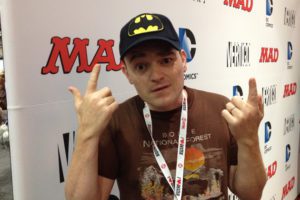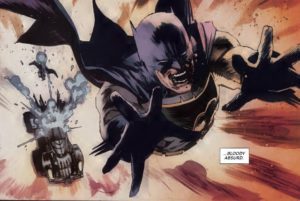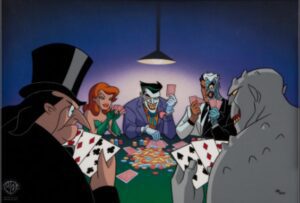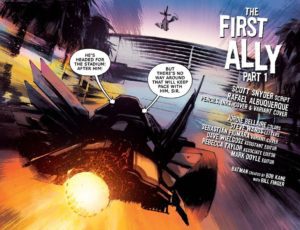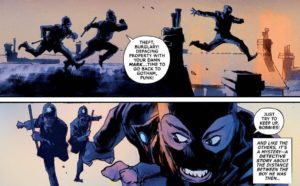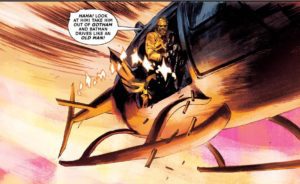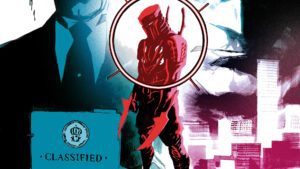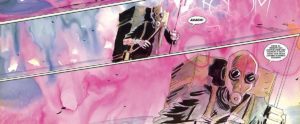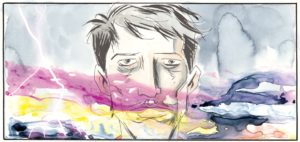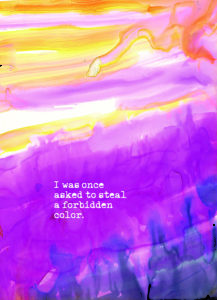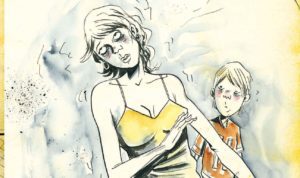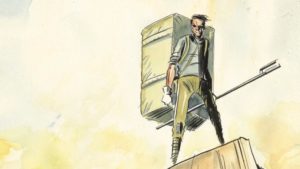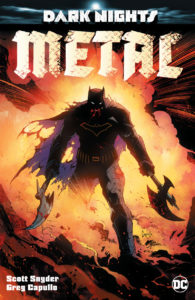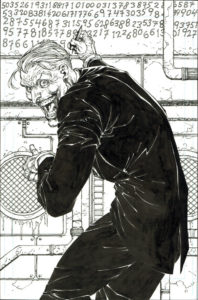In my latest interview with prolific comic book writer Scott Snyder, we discuss the newest arc in All-Star Batman involving the past of everyone’s favorite gentleman’s gentleman Alfred Pennyworth. This newest arc, titled The First Ally, takes Bruce and Alfred to Miami and into the heart of a new generation of pirates as everyone involved is after a mystery device that can change the world. Complicating matters is a shadow from Alfred’s past that has resurfaced in the present. We also discuss the finale of his Image Comics series A.D. After Death with Jeff Lemire. We talk about the costs of immortality and how a character reacts when motivated to conquer his own fear. We also discuss a few items related to the upcoming huge DC Comics story arc Metal that he is overseeing.
All-Star Batman #10 The First Ally Part 1
Deron Generally: Thanks for talking to me again. I know you’re extremely busy right now.
Scott Snyder: No problem man. I look forward to these.
Deron Generally: Alfred has been interpreted so many different ways and his past has always been a bit of a mystery. So after coming off of a huge, really intense arc like Ends of the Earth, what made you decide to focus on a more intimate story centering around Alfred?
Scott Snyder: That’s a really good question. I think I wanted to do exactly what you’re saying. I realized that there haven’t really been a lot of deep dive stories into Alfred’s military days or his past. Also, I did want to change tonally. Ends of the Earth was a mostly cerebral arc where each issue was self-contained and a little more exploratory about each villain. We changed art issue to issue, so it had more singularity issue to issue. Even though it was one huge arc at the same time, it was like a meditation on each villain.
This time I wanted to switch gears and go back to a Paul Dini, Batman: The Animated Series style with the storytelling which I hadn’t really had a chance to do on All-Star. The first arc was really meant to be kinetic and, hopefully, feel like a truck barreling down a road taking all kinds of strange turns. I had cuts in it that went back in time to mirror the way Two Face was forcing you to look deeper. Here, I just wanted to go smooth with really fluid storytelling. That’s why I set it in Miami where it could have that sort of breezy, dark noir feel.
Deron Generally: I can see that in the moments between Bruce and Alfred on the balcony.
Scott Snyder: Yeah. The stuff I love about Paul Dini’s work and Batman: The Animated Series that is so baked into my DNA is that I love the way that he’s able to tell these really different stories about Batman through the lens of peripheral characters. They’re often told through the point of view of a low level criminal or a big villain from Arkham or Alfred or another ally of Batman’s and so on. Even though Bruce is the hero in those stories, often the emotional arc comes from the characters around him who go through a change while watching him be heroic. I wanted to try something in that vein and use Alfred. I could tell an emotional story where Alfred has to come to grips with things from his past, but at the same time features Bruce in this bombastic way.
So there is a lot of pirate adventure stuff, crocodiles, underwater casinos, submarines, getting shot out of the Batmobile at helicopters. So there is high-flying Batman adventure, but I do get to go deep with Alfred and his past and explore his emotional trajectory with this one.
Deron Generally: I understand what you were saying about the animated series especially and Batman’s story being told through the eyes of other people. It brought to mind one of my favorite episodes “Almost Got Im”. Where you have the villains sitting around…..
Scott Snyder: (Laughs) I remember. The one where they’re all telling their stories. I love that one.
Deron Generally: Yeah.
Scott Snyder: Isn’t that the one where it turns out he was Killer Croc the whole time?
Deron Generally: Yes (Laughs). Getting back to All-Star, I really enjoyed the juxtaposition between the narration and the events that we’re seeing unfold. The surprise at the end is really earned because of that. Alfred’s relationship with Bruce has always straddled a weird line between employer/employee and father/son. What challenge did you face in trying to showcase those dynamics?
Scott Snyder: I’m trying to look at it from the point of view of how Alfred would. The stories are usually in Bruce’s POV and he looks at him (Alfred) as a father, but he never calls him that because he is loyal to the memory of Thomas Wayne and he still has those memories. In terms of Alfred, Alfred certainly considers Bruce to be his son. Not in contradiction to Thomas being his father, but in terms of his affection, he couldn’t love him anymore if he were his biological son than he does already. So I wanted it to be a term of affection that Alfred uses openly.
I wanted to explore the ways in which he is a father and this is one of the things I relate to the most about this character and why I love writing Alfred so much is, because I have two sons. I can imagine what would happen if they took on jobs that made me very proud because of the heroism involved like a firefighter, but hating it as well because it put them in danger all the time. In that way, Alfred is the quintessential father figure and I wanted to mine that by telling the story from his point of view.
Alfred would do things for Bruce that Bruce wouldn’t do for himself. I believe if it came down to it, if Bruce decided to finally pull the trigger on The Joker, I’m sure Alfred would caution him against it, but Alfred would do it in a second if it were a choice between Bruce living and dying. There are lines that you would cross as a father for your kid that I think Alfred would cross for Bruce that Bruce wouldn’t cross for himself.
Deron Generally: I’m glad you mentioned that because there are still things that we don’t know about Alfred that haven’t really been explored before.
Scott Snyder: This really does dig deep into Alfred’s past to his days at MI6. After his military service, he joins MI6 and he becomes part of a special program where they want him to work off the books you know. To be an operative who would be working for the government but never acknowledged as being so. I also started thinking about his age and how he’s about 58 in our timeline, which would put him in the middle of the punk music scene in London as a teenager.
I love the fact that it’s not too crazy to think about Alfred Pennyworth as a punk teenager being angry at his father and all that stuff. That gives his life an interesting trajectory. The reason why I wanted to start this issue with a parallel between Alfred and Bruce is that they were both angry young kids who don’t know how to deal with their feelings and it leads to them searching for a purpose in their life. Alfred joins the military and Bruce winds up fighting his mission as Batman and they both trained within an inch of their lives because they were consumed with this obsessive purpose. So I think Alfred relates to Bruce a lot more than he would actually admit.
Deron Generally: I can see that. It definitely goes back to one of the points you were making about their dynamic. I have two boys myself and my family has a tradition of serving in the military so I would be proud if either of my boys chose to serve. The difference between our circumstances and Alfred’s are that no one would expect us to be flying the helicopter plane that our son’s would be jumping out of like Alfred finds himself doing a lot (Laughs).
Scott Snyder: (Laughs) But isn’t there this part of you that almost wants to as a way of protecting them?
Deron Generally: Definitely in that respect.
Scott Snyder: I definitely feel that Alfred and Bruce have this crazy relationship. At times it can be a little too close for comfort, but you can also understand why Alfred would sign up to be there by Bruce’s side rather than someone else. The series is like that a lot. It also has tons of cool villains like Hush and a bunch of other villains who show up later. The idea being that because it’s Miami, they don’t like Gotham villains. They don’t work with them at all because they’re afraid Batman might show up.
Deron Generally: So does the big bad in this story have a connection to Alfred’s time in the program you mentioned?
Scott Snyder: Yeah. I won’t spoil it but the program that Alfred was in was shut down after his time in it and he starts to believe that it might still be in operation because of what he sees in this issue. In that way, his past starts catching up to him and he has to come to terms with some of the things he did back then. Alfred was never a villain back then but the way he relates to his first Ally is a big part of it, especially when talking about father figures and the choices he has to come to terms with.
One of the things that comes to light in the next issue is something called the Alfred Protocols. It’s essentially an AI programmed with Alfred’s personality that Bruce is building into the Bat-Computer. The irony of it is that Bruce still doesn’t really know a lot about Alfred, especially parts of his past.
Deron Generally: It is ironic that the World’s Greatest Detective doesn’t know many of the aspects of the past of the person who has been the closest to him for most of his life. What’s interesting is that it’s almost like he’s never bothered to look.
Scott Snyder: Yeah
Deron Generally: Every other mystery seems to intrigue him but this persona he’s built for his father figure has stopped him from ever deciding to dig deeper.
Scott Snyder: Exactly. That’s exactly what we’re going for. I’m really excited about it. I love working with Rafael (Albuquerque) and Jordie (Bellaire) and everyone. I really hope people enjoy this one because I’m having such a good time. I really appreciate having the kind of freedom that All-Star offers from DC. I’m working on something big right now with Metal which is great, but it’s nice to be able to Batman stories that are based on where your imagination takes you or whatever you’re feeling with the artist or team involved is a real joy. I’m really grateful to have it.
A.D. After Death Book 3
Deron Generally: The ending of this story wrecked me. The shot of Jonah on the beach just had my mind racing. I could not stop asking questions and almost writing the next part of the story in my head. It was surreal.
Scott Snyder: Thanks man. That means a lot. You’re literally the first person I’ve spoken to about it. It took a lot out of me and Jeff (Lemire) and it was definitely the ending that we wanted. We had actually written it from the end in terms of him realizing this terrible thing that is happening to him and his hand in it.
(There are spoilers ahead, so if you have not read the finale of A.D. After Death, I suggest you do.)
We wanted to leave a little bit of hope in this one because essentially Claire is running out of time because each time he’s come up short over and over again. There’s this hope that because he’s getting to the end of the wick of his candle, that this time he’ll actually go. In my mind, this is the greatest chance he’ll ever have to take the shot.
It’s one of those books that was so interesting to write because I was terrified the whole time, to be upfront about it. I hadn’t written prose in years and I started to dabble with it again in Batman, American Vampire, some stuff in Wytches. I started to play around with it because I really missed it. When I spoke to Jeff about it and this story, he told me that it would really need to be a blend of prose and comics. I told him it was going to be a huge undertaking to do it that way and he said let’s just do it.
He was such a great partner. He always gave me the room to try things. He was always open to expanding or contracting things. This was truly a collaborative experience and we wound up making it in our spare time together. It’s a deeply personal book in that the things that Jonah experiences as a kid with his mother passing away are based off experiences I had with my great grandmother and other people I knew dying when I was young.
The odd proximity of being around those things unsettled me and it hit a nerve that I wish I wasn’t susceptible to and it shows me things that I don’t like about myself. This concerted fascination with and terror around my own mortality. I wish I could get it out of my head more than I can and the way that Jonah describes it like being on a frozen lake in book one, how he feels small. How, in his best moments, he can still feel insignificant.
Deron Generally: It does seem to go in some really small, intimate areas in the narrative.
Scott Snyder: It’s a really personal book in the anxieties that he feels, the fear he has of never getting over fear, the sense of things moving too fast, his ticks and habits are all things that are slightly autobiographical. Worrying that you’re some completely self-absorbed coward and you’re not built right because you have these worries instead of being more outward looking. All of it is very nerve-wracking to write about because it’s not just personal, it’s embarrassing.
We’re not similar in that I’m not this myopic self-absorbed person who gets consumed by it like Jonah. I have children. I do my best to be active civically. There are causes that I believe in. So I’m not insular the way Jonah is, but I wanted to write this nightmare version of myself in some way. When I have bad bouts of depression or anxiety, the way Jonah thinks is how I feel day in and day out. There will be weeks when I cannot get out of my own head.
It is a very personal book and a challenging one both to read and to write, but it was a huge step for me because we had a personal family thing that happened during the time I was writing it an I had to take some time to get myself together to be able to push forward. There was a period when I didn’t think I was going to be able to finish it. Jeff was great during that time. The fact that I was able to complete it, be proud of it and be able to look back and read it means a lot to me. Jeff helped me through this and we made it and it’s something we both really love. It gave me confidence to try risky stuff going forward.
Finishing it definitely informs on the things I’m going to be doing in the next couple of years in comics.
Deron Generally: I can appreciate that absolutely and I am glad that you finished it. There was so much great material in it that you and Jeff were able to put in without any of it feeling unnecessary. There was no sense that you were padding the story at all. There are moments in the story where you think about your own actions in the decisions that Jonah makes and how people will see the outside decision that you make, but will never know the internal agony that went into making it.
Scott Snyder: Definitely. That’s the thing. You live locked in your own head when you’re not feeling well and it becomes this hall of mirrors where you just see ugly reflections of yourself. With this story, we wanted to make something that was really speculative science fiction with a level of mystery and bombast. On the flip side give it this emotional, almost autobiographical prose. It was a real challenge and I was concerned with how it was going to blend. I think Jeff laid it out so perfectly that it carries both sides. The prose sections have this emotional weight and the comic side has this anxiety in Jeff’s art where it’s sort of shaky and unnerving. I feel like his art is the perfect bridge for all of those elements.
I can’t express to you what a rewarding experience this has been and to do it with Jeff. It’s cemented our friendship for life. The fact that he helped me make this book and he brought his A game. I just can’t say enough good things about Jeff Lemire. Everyone should have a friend like him. We’ll be old men and I’ll still be thanking him for this.
Deron Generally: You both seemed to find the right balance of broad and personal with the story. What were some of the bigger elements you wanted to focus on?
Scott Snyder: I think one of the things that makes it timely is what the cure (for death) offers. Instead of it being a way to engage with the world where people like Jonah think it will make them braver and have fewer worries because there is less to worry about, instead it becomes the ultimate selfishness where you lock yourself away from the world. It becomes this nightmarish cycle of renewal and forgetfulness and losing yourself. It’s becoming a closed loop. I was trying to make something personal but also try and connect to things that are in the air right now.
Deron Generally: I understand completely. It is interesting to put yourself in Jonah’s shoes in that instance in the finale where you have to determine whether or not you have the courage to face the unknown of inevitable death or flee to the comfort and familiarity of never-ending existence.
Scott Snyder: Exactly. Those impulses to want things to be the way they used to be. The desire to retreat to things that are comfortable. All of those things, to me, are just irrational solutions to complicated issues. It’s the same kind of pulling away that Jonah is talking about. We tried to put those things in conversation with each other and play around with different ideas.
We wanted to say that you can’t retreat from the problems in the world. That they are big and scary and may not be solved in your lifetime, but you still throw yourself into the challenge. We hint at that when we discuss people surviving The Dying. The fact that people don’t know what happened and how because they retreated and weren’t a part of it. There were a lot of different threads that we were playing with.
Deron Generally: That’s what makes it work. It isn’t predictable. The mixture of the prose and art made me more invested in the story by learning about them in the prose and the art as an extension of it. The conversation between Jonah and Errant at the end informed that as well. The fact that Errant even seemed bored with this dance that they keep doing was fascinating to me.
Scott Snyder: To Errant, it’s an experiment. It’s a game to him and Jonah’s acts both amuse and intrigue him.
Deron Generally: It’s like he’s bored with his own immortality as well and is looking for anything to bring him some excitement, which itself is a little somber. I really enjoyed this series and I’m glad you completed it.
Scott Snyder: Thanks man. You think we pulled it off?
Deron Generally: Absolutely. It touches on things in life that we deal with now. It touches on and makes us ask questions of ourselves as people. It has a great multidimensional character in Jonah where we see some of the negative aspects of ourselves in him, but still hope that he succeeds and then that gut punch in the end that is surreal in how it concludes and how the audience clamors to know what’s next in their own minds.
Scott Snyder: Thanks dude. We didn’t want it to give any kinds of platitudes or pat answers about any of this and it ends on a note that’s more troubling. I just love the book and I really appreciate talking to you about it and we definitely need to do this again. It really means a lot and I love these talks that we get to have and honestly getting to talk about this one particularly is a thrill. Thanks again.
Deron Generally: Thank you man. I love the opportunity as a fan to talk to you about your work and you process. Beyond discussing the work itself, I learn more about writing and I appreciate it more.
Scott Snyder: Thanks man. That made my night. We should talk again with the next issue of All-Star and especially when Dark Days gets close next month.
Deron Generally: Awesome. Talk to you soon.
Dark Nights: Metal
Scott and I talked for about thirty minutes regarding Metal and the arc he’s working on for DC Comics this summer and this is all of the spoiler-free info that I can give you.
The series imagines the existence of a Dark Multiverse.
It will feature a creature that is linked to both Darkseid and Batman.
The Court of Owls has a hand in the events.
There will be a Dark Multiverse version of one of our heroes. More than one in fact.
There will be a series of one shots linked to the overall story.
The story is going all out and there will be huge concepts throughout with heroes from all over the DC universe getting together to end the threat.
There will be huge sequences and action but it will also pull on some emotional threads connected to many of the heroes.
Scott Snyder: I’m trying really hard to make an event that lasts. Something that’s an expansion of the cosmology and such but at the end of the day, the most important thing is that people walk away from it feeling that this is a celebratory thing about the greatness of superheroes in dark times. I just want them to have fun.
Personally, I cannot wait to find out more and to read this story. All-Star Batman #10 and A.D. After Death are available now from DC Comics and Image Comics.
Deron Generally
@grimorian219 on Twitter


